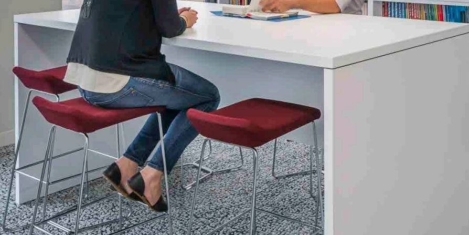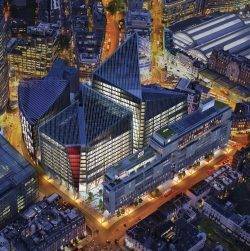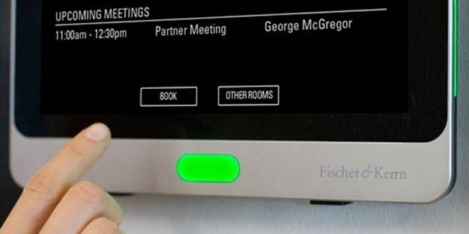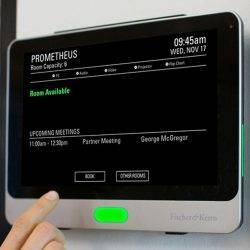May 10, 2018
New framework aims to ensure facilities managers have the expertise to keep up with demand for services
 The Royal Institute of Chartered Surveyors (RICS) and the International Facility Management Association (IFMA) have created a new framework which sets out to provide strategic best practice advice and outline how facilities managers can make the most of their expertise to keep-up with the growing demand for FM services. The Strategic Facility Management (FM) Framework authored by Dave Wilson, FRICS, IFMA Fellow for the IFMA-RICS collaboration – sets out a more ‘holistic approach’ to planning the provision of FM, with best practice advice on how to achieve maximum value from a workplace, including gaining environmental benefits, improving productivity, whilst also protecting employees and consumers. The framework also sets out some of the key aspects of how and where facility managers can play a bigger, more valuable role in the corporate real estate decision-making process, including property acquisition and disposal.
The Royal Institute of Chartered Surveyors (RICS) and the International Facility Management Association (IFMA) have created a new framework which sets out to provide strategic best practice advice and outline how facilities managers can make the most of their expertise to keep-up with the growing demand for FM services. The Strategic Facility Management (FM) Framework authored by Dave Wilson, FRICS, IFMA Fellow for the IFMA-RICS collaboration – sets out a more ‘holistic approach’ to planning the provision of FM, with best practice advice on how to achieve maximum value from a workplace, including gaining environmental benefits, improving productivity, whilst also protecting employees and consumers. The framework also sets out some of the key aspects of how and where facility managers can play a bigger, more valuable role in the corporate real estate decision-making process, including property acquisition and disposal.











 Users of co-working and flexible space rapidly growing in numbers, according to a report, Marketplace for flexible work, from research conducted by (flexible workspace provider) The Instant Group and architects HLW. The report claims to ‘analyse’ the coworking and flexible workspace sector to gather a ‘360-degree perspective’ of the industry to determine where ‘perspectives align and diverge among stakeholders’. The research also claims that location and the ability to assign or reassign employees to workspace on short notice were also important influencers when choosing flexible workspace over conventional office space. Looking forward, the research claims that more than half of the companies interviewed envisage spending less time working from a traditional company office space.
Users of co-working and flexible space rapidly growing in numbers, according to a report, Marketplace for flexible work, from research conducted by (flexible workspace provider) The Instant Group and architects HLW. The report claims to ‘analyse’ the coworking and flexible workspace sector to gather a ‘360-degree perspective’ of the industry to determine where ‘perspectives align and diverge among stakeholders’. The research also claims that location and the ability to assign or reassign employees to workspace on short notice were also important influencers when choosing flexible workspace over conventional office space. Looking forward, the research claims that more than half of the companies interviewed envisage spending less time working from a traditional company office space.
 Organisations are failing to get the basics right when it comes to providing the digital and virtual systems that support employees in their roles, despite an evolving technological landscape and rise in flexible working, a new report has claimed. Data released by Leesman analyses how organisations can better support employees by offering the technology tools and infrastructure that enable people to work in a flexible way. In Deloitte’s 2018 Tech Trends report issued at the beginning of 2018, there was a heightened focus on how disruptive technologies will help businesses achieve larger strategic and operational goals and drive greater value. It predicted that within the next two years, more companies will embrace the emerging ‘no-collar workforce’ trend by redesigning jobs and reimagining how work gets done in a hybrid human-and-machine environment. However, Leesman’s findings show that, as of yet, organisations are failing to get the digital basics right. According to its latest dataset (Q1 2018) 23 percent do not agree that they have the technology tools and infrastructure that enable them to work in different locations across the office or from different locations outside of the office.
Organisations are failing to get the basics right when it comes to providing the digital and virtual systems that support employees in their roles, despite an evolving technological landscape and rise in flexible working, a new report has claimed. Data released by Leesman analyses how organisations can better support employees by offering the technology tools and infrastructure that enable people to work in a flexible way. In Deloitte’s 2018 Tech Trends report issued at the beginning of 2018, there was a heightened focus on how disruptive technologies will help businesses achieve larger strategic and operational goals and drive greater value. It predicted that within the next two years, more companies will embrace the emerging ‘no-collar workforce’ trend by redesigning jobs and reimagining how work gets done in a hybrid human-and-machine environment. However, Leesman’s findings show that, as of yet, organisations are failing to get the digital basics right. According to its latest dataset (Q1 2018) 23 percent do not agree that they have the technology tools and infrastructure that enable them to work in different locations across the office or from different locations outside of the office.

 It can be proven that a well implemented Occupational Health service can offer a good return on investment, finds a new report. A white paper, produced by the Society of Occupational Medicine (SOM), the International SOS Foundation and KU Leuven University,
It can be proven that a well implemented Occupational Health service can offer a good return on investment, finds a new report. A white paper, produced by the Society of Occupational Medicine (SOM), the International SOS Foundation and KU Leuven University, 








 Take up of commercial office leases in London’s West End had its strongest start to the year since 2012, with the banking and finance sector continuing to actively seek space, new figures from CBRE have revealed. The amount of office space under offer on in Central London at the end of Q1 2018 stood at 3.2m sq ft, representing an increase of 6 percent on the previous quarter and showing a 3 percent increase on the same point last year. Take-up in Central London reached 2.8m sq ft in Q1 2018, with its largest deal boasting a 65,900 sq ft letting to WS Atkins at Nova North in Victoria. Availability in Central London increased by 7 percent to 14.3m sq ft but that is still below the total 12 months ago. A total of 1.1m sq ft of development and refurbishment space completed in Q1. A further 2.3m sq ft is expected to complete before the end of the year, of which 54 percent has already been committed to be leased. By the end of the quarter, 9.1m sq ft was being actively sought by occupiers, primarily from the banking and finance sector (26 percent) and creative industries sector (24 percent).
Take up of commercial office leases in London’s West End had its strongest start to the year since 2012, with the banking and finance sector continuing to actively seek space, new figures from CBRE have revealed. The amount of office space under offer on in Central London at the end of Q1 2018 stood at 3.2m sq ft, representing an increase of 6 percent on the previous quarter and showing a 3 percent increase on the same point last year. Take-up in Central London reached 2.8m sq ft in Q1 2018, with its largest deal boasting a 65,900 sq ft letting to WS Atkins at Nova North in Victoria. Availability in Central London increased by 7 percent to 14.3m sq ft but that is still below the total 12 months ago. A total of 1.1m sq ft of development and refurbishment space completed in Q1. A further 2.3m sq ft is expected to complete before the end of the year, of which 54 percent has already been committed to be leased. By the end of the quarter, 9.1m sq ft was being actively sought by occupiers, primarily from the banking and finance sector (26 percent) and creative industries sector (24 percent).









